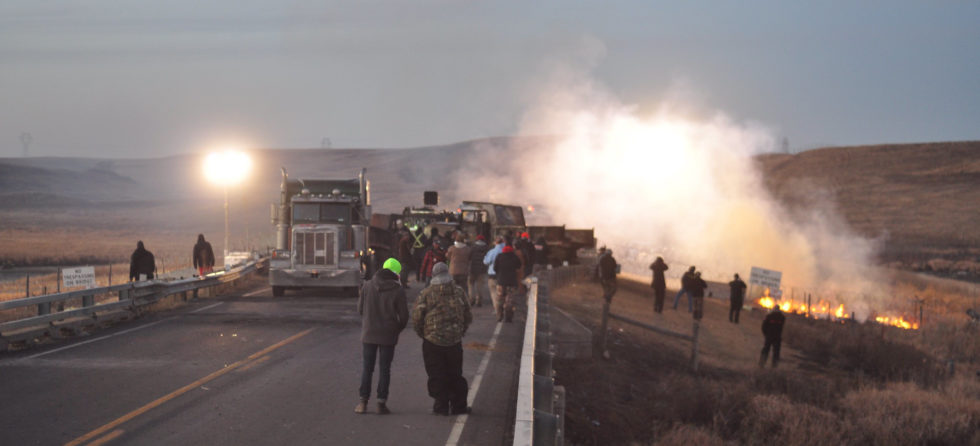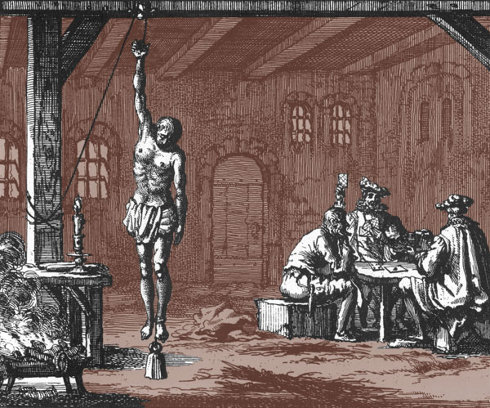
This was originally posted on Facebook on February 12, 2008.
I just read John McCain’s victory speech after today’s Republican primaries. This passage caught my eye:
They will paint a picture of the world in which America’s mistakes are a greater threat to our security than the malevolent intentions of an enemy that despises us and our ideals; a world that can be made safer and more peaceful by placating our implacable foes and breaking faith with allies and the millions of people in this world for whom America, and the global progress of our ideals, has long been “the last, best hope of earth.”
It’s interesting to read this passage in light of Confessions of an Econonomic Hit Man by John Perkins which I’m just finishing. The book is a highly readable exposé of Perkin’s own role in America’s “mistakes” – actually America’s tremendous success in building a global corporatocracy. It’s this corporatocracy that has directly (see Mujahideen) and indirectly nurtured corrosive grievance into extremism. (more…)
TimN
February 12, 2022
Economics, empire, patriotism, Politics
Read more >

This morning’s NY Times piece, “How It All Came Apart for Bernie Sanders” is a must read for every supporter of the Sanders campaign. It’s not a pleasant article, but learning from mistakes is critical collective work, even when it happens in a painful public way. While the focus of my political work has not been electoral campaigns, I think we have to recognize that the Bernie movement is inextricably tied to electoral politics. So it must, to some extent, submit to measuring itself by that framework, which is the focus on the NY Times piece. It must also grapple with a grasroots movement measuring stick as well given that the campaign claimed that mantle. Alexander Burns and Jonathan Martin do not speak that language and so I will try to do some extrapolation work from their journalism. (more…)
TimN
March 21, 2020
empire, Politics, Power, President
Read more >

This review was originally posted two years ago on radicaldiscipleship.net
8 years ago, I showed “What a Way to Go” to my family. I hope they would, as the movie tag line says, come to grips “with Peak Oil, Climate Change, Mass Extinction, Population Overshoot and the demise of the American lifestyle.”
Halfway through the movie my sister walked out. It wasn’t so much that she was opposed to the message of the movie. She just couldn’t take how relentlessly depressing it was.
I suspect all of us in the radical discipleship movement have been there at one time or another. We go through some form of the transformation that Tommy is documenting in his post-evangelical series. In one way or another we begin to grasp that catastrophic path our civilization is on. Which begs the question: How do we get others to recognize it to?
Broadly speaking, this is a question of pedagogy, or how people learn. Watching an accurate, though deeply demoralizing documentary was not the way to go for my sister. Messages of doom just aren’t that effective at winning converts.
The producers of the new documentary Inhabit clearly understand this. As one person interviewed in the film puts it, focusing on catastrophe has limited change potential. Their documentary is a lush, alluring opposite to “What a Way to Go”in many ways except one: the message is the same: ultimately industrial agriculture will destroy us all and we need an alternative.
From there the two films diverge dramatically: Inhabit opens by focusing on the hopeful, human-centered framework of regeneration: putting positive things back into the land. “We can actually be healing forces,” says permaculturalist Ben Falk.
“What could it be like if humans could make this place sing with life?” asks Lisa Fernandes, director of the The Resilience Hub. “That gets me really fired up.”
(more…)
TimN
July 30, 2017
bioregionalism, Civilization, empire, extinction, Permaculture
Read more >
“The Spirit of the Lord is upon me, because he has anointed me to bring good news to the poor. He has sent me to proclaim release to the captives and recovery of sight to the blind, to let the oppressed go free, to proclaim the year of the Lord’s favor.” Luke 4:18-19
“…the hands of none of us are clean if we bend not our energies to righting these great wrongs.” W.E.B. DuBois
I traveled to Ferguson, MO from August 21-24 along with two other community organizers from New Orleans, LA. We visited the Canfield Green apartments where 18 year old Michael Brown was shot and killed by a police officer and where beautiful memorials had been created. One sign referenced the story of Cain and Abel in Genesis 4: 8-10 — “And the Lord says: ‘What have you done? The voice of your brother’s blood cries out.” And indeed, roses lined the street where traces of Michael’s blood were still evident, crying out for those with ears to hear.
We talked with Ferguson residents, including a group camped out in a parking lot across from the police station and some youth camped in the “approved assembly area” in the parking lot of an old car dealership. Both of these groups said they planned to stay until Darren Wilson, the police officer who killed Michael Brown was indicted, and we brought them water and ice and fruit as a way of expressing our support and appreciation for their persistent call for justice.
That evening, we saw how W. Florissant Avenue was closed to all thru traffic beginning at its intersection with Chambers Road, a full mile away from the “approved assembly area.” Anyone who wanted to join the protest had to walk a mile just to get to the protest site and then march in a spot cut off from the rest of the public, where police imposed a “5 second rule” which required protesters to keep moving, breaking up any conversations among groups of protesters who began to gather together.
This was only the most recent attempt to contain and squash people’s cries for justice. Others who had been in Ferguson earlier reported even more intense police repression. Police shot tear gas and rubber bullets at unarmed people who were in places they had every right to be including their own backyards, driveways and doorways. Purvi Shah of the Center for Constitutional Rights was part of a multigenerational crowd –including a number of children– into which police fired tear gas, with no warning and a full three hours before the midnight curfew that had recently been established. Many first person stories of encounters with police oppression are available if you look for them. What we saw in Ferguson was a community under occupation by police. No one felt safer. The constant threat of violence by police toward protestors was palpable.
(more…)
PamN
August 30, 2014
antiracism, Current Events, empire, Nonviolence, Peace & Peacemaking, Police, Police Brutality, Power, Race, Social justice, Social movements, Violence, Young Folksantiracism, empire, Nonviolence, Peace & Peacemaking, Police Brutality, Power, Race, Social movements, Violence
Read more >
We are Anabaptists. We are Mennonites. We are distinct from other Protestants and denominations. We care about peace, justice, community. We are a unique and special people.
Many of us feel this way or at least I know, at times, I do. There is a special quality of Christianity that is evidenced in Anabaptism. Yes, we were persecuted by the Holy Catholic Church, but we were also persecuted by fellow Protestants. There is severity and deep conviction in our confession of faith.
Yet, in truth, too often we rest on the laurels of our Anabaptist forebears. We recall or express nostalgia for the countercultural, anti-empire sentiments and actions of those who came before us, all the while colluding with the current empire on many levels in our life. Some of us (even unwittingly) invest in stocks for pharmaceutical corporations and weapons manufacturers, thus endorsing a system that benefit from death and destruction.
Many persons and whole churches have substituted absolute pacifism with Just War Theory. In that regard we have embraced Augustinean Christianity to the detriment of Jesus’ command to love even our enemies who persecute and abuse us. We claim a Mennonite identity, but too often embrace an American identity or political ideology (whether left or right). We fail to recognize the radical calling upon our lives, which is to root ourselves in a Christ identity.
Some of us need a fresh baptism, a next baptism to awaken us to Christ’s calling upon our lives. We may have been baptized in water, but now we need a fire baptism to burn out the iniquity and inequality that pervades our lives. Like a prairie fire that burns the dead things and promotes richer soil, so too do we need the Spirit of fire to prepare us to live more deeply and richly. (more…)
JasonS
August 20, 2014
activism, Anabaptism, antiracism, Biographical, Books, Change, Church, Class, Community, Conscientious Objection, Economics, empire, Martyrdom, Mennonite Church USA, Military, neo-Anabaptism, New Monasticism, Nonviolence, Peace & Peacemaking, Social justice, Social movements, Spiritual Life, Stories, Urban Ministry, Writing
Read more >
I recently wrote about Romans 13 and the state. I mentioned that I did not believe that text was even about the Roman government. I believe, based upon the evidence I have seen, that Romans 13 talks about reconciling Jewish and Gentile Christians in relation to the religious, community authorities. Tyler Tully picked up on this and wrote a far more detailed analysis of this here and here, which I strongly recommend reading.
Today, another questionable text in regards to the New Testament and the state has been brought up, this time from Peter instead of Paul:
Be subject for the Lord’s sake to every human institution, whether it be to the emperor as supreme, or to governors as sent by him to punish those who do evil and to praise those who do good. For this is the will of God, that by doing good you should put to silence the ignorance of foolish people. Live as people who are free, not using your freedom as a cover-up for evil, but living as servants of God. Honor everyone. Love the brotherhood. Fear God. Honor the emperor. (1 Peter 2:13-17 ESV)
This passage is a bit different than Romans 13. Unlike Romans 13, this passage is pretty straightforward. Romans talks about vague authorities, the sword, and taxes, and it is surrounded by teachings on religious instruction and ethics. Simply put, Romans requires a lot of unpacking in addition to looking at possible translation errors. On the other hand, this passage from 1 Peter is pretty much independent, and any issues in our reading of the text would primarily originate from possible translation errors. (more…)
KevinD
February 12, 2014
Anabaptism, empire, Interpretation, neo-Anabaptism, patriotism, Politics, Power, President, The Bible1 Peter, empire, Jesus, kingdom, Peter, Romans 13, the state
Read more >
When I began looking for an Anabaptist congregation, I was immediately drawn to the San Antonio Mennonite Church here in the Alamo City. Truth be told, I probably would have stayed within our house-church if it weren’t for the fact that many of our families were moving. But as necessity compelled me to search for a tribe, the Anabaptist emphasis on Jesus discipleship, servant minded non-violence, and its history of persecution welcomed me. I’m glad we found a home in the MCUSA.
Having grown up as the son of an ordained minister in the Southern Baptist Convention, I was frightfully aware of the denominational politics our family encountered having served under two SBC Presidents. But Anabaptism offered more than that, with less, or so it seemed.
Theda Good’s recent ordination seems to have served as a sort of catalyst in the ever growing divide between the young and old, urban and rural MCUSA membership. But from my location, these reactionary reverberations seem to find their epicenter on the conservative side of the aisle while the almost certainly inevitable LGBTQ ordination seems to originate on the progressive side. Regrettably, I feign to even use the binary language associated with progressive versus conservative politics, but it seems that such language indicates that we have already bought in to the us vs. them mentality that dominates our American culture.
What about the Third Way?
I’m perplexed as to why we’re having this conversation in the first place. Looking at arguments from “both sides,” I keep asking myself, “where is Jesus in this?” I see Jesus in the calls for humility and servanthood. I see Jesus in the cautionary language encouraging dialogue instead of schism. But I don’t see Jesus in the Soddom and Gommorah rhetoric, and neither do I see it in the practice of ordination.
(more…)
TylerT
January 3, 2014
activism, Anabaptism, Bigotry, Church, Class, culture, Current Events, empire, Exclusion, Faith, Gender, Leadership, LGBTQ, Mennonite Church USA, neo-Anabaptism, Privilege, Race, Schism, Sexism, Social justice, The Bible, Tolerance, Tradition
Read more >
There was one text in the Bible that has been the most influential on my life. It was this text that really helped convince me to become a Christian, and it was this text that brought me into radical politics. The passage I am referring to is the Sermon on the Mount.
It was when I was in middle school that I was first introduced to this famous sermon, and it ignited my interest in the gospel. By reading its words, I fell in love with the man who spoke them, and I wanted to apply the sermon to all aspects of my life. It was a big reason that I became interested in left-wing and anti-war movements as well. It would be years later, when I read Leo Tolstoy’s The Kingdom of God Is Within You, that I really started to realize just how much was packed into Matthew 5-7. Recently, a friend of mine who I know from both Young Anabaptist Radicals and MennoNerds, said, ”The Sermon on the Mount or Plain is the Christian’s constitution.” I think there is a lot of truth to that. (more…)
KevinD
November 13, 2013
Anabaptism, Church, Economics, empire, Ethics, neo-Anabaptism, Nonviolence, PoliticsChristian Anarchism, Constitution, Leo Tolstoy, politics of Jesus, Sermon on the Mount, the Kingdom of God Is Within You
Read more >
Earlier this month, Charity Erickson wrote an article, “Peace Reformation = Humble Leaders” that offered some questions and challenges for neo-Anabaptists around leadership and the roots of this growing movement. The response, in the comments on her post and on social media, was cantankerous. I followed up with her to do an interview, the fifth in my Anabaptist camp followers series. My questions are in bold. Crossposted from As of Yet Untitled
 What does neo-Anabaptism mean to you?
What does neo-Anabaptism mean to you?
Charity: I understand neo-Anabaptism to be an ecumenical movement that is inspired and influenced by Anabaptist thought. This influence isn’t confined to traditional Anabaptist thought as expressed in documents like the Schleitheim Confession; it includes the critique of power that we get from post-modernism and post-colonialism. These critiques are not native to Anabaptist thought. In many ways, they are not native to Western thought. But they are good critiques; they are Spirit-guided, I think.
How did you first come across neo-Anabaptist thought and practice?
Charity: When I was 11–around 1996–I joined the Bible Quiz team at my Christian Missionary Alliance church. We memorized a lot of scripture; but we also had these t-shirts that we inherited from a group that had recently split off from our church to focus on their urban ministry in Minneapolis, which included communal living, serving those struggling with poverty, and fostering interfaith dialogue. The t-shirts were black with an anarchic kind-of symbol on the front, and the words, “Resistance is Futile.”
(more…)
TimN
October 26, 2013
Anabaptist Camp Followers, empire, neo-Anabaptism, Power, Privilege, Race, Sexism
Read more >
There is a growing movement of pastors, church planters, and churches around the globe who have become convinced that the center of the Gospel is a Jesus-looking God who calls his people to partner with him to advance a Jesus-looking kingdom. Â They sense that God is pouring out “new kingdom wine” that is bursting apart the tired old wineskins of Christendom. They sense we are at the cusp of a rising kingdom revolution that is going to radically alter what people identity as “the Christian faith” and “the Church.” Â The majority of these leaders are both encouraged and discouraged. They are encouraged by the Jesus-looking kingdom revolution they see rising up, Â but discouraged by the lack of networking and partnership amongst others who share their convictions. –Greg Boyd and Mark Moore
Several weeks ago, Greg Boyd and Mark Moore hosted a network exploration meeting for Neo Anabaptist types in the hours leading up to the conference on “Faith, Doubt and the Idol of Certainty.” The conference, hosted by Woodland Hills Church, was slated to coincide with the recent release of Boyd’s latest book, Benefit of the Doubt. (which I hear is highly worth reading)
But it was the Neo Anabaptist “network exploration meeting” that became the basis of buzz amongst online Anabaptist circles as of late.
There certainly seems to be a need for cohesion among the emerging Neo Anabaptist churches and pastors across the country–something that goes beyond denominationalism, but can work in tandem with existing avenues (such as denominations) that many of us already have relationships with. Many think we have an opportunity to create a missional organization or association that empowers “the boots on the ground,” so to speak–a platform for Post Christendom theology and praxis.
Perhaps it is time to start bringing together minds and bodies in order to create a space for open resources, networking, and mutual affirmation. Still, the conversation thus far has given me pause, and so I want to highlight a few pitfalls to I think we should avoid as well as present a few proposals that cast some vision for the Post Christendom Reformation.
The Pitfalls
1) We need to acknowledge our privilege:
What I am not seeing so far is a space that creates agency for women, minorities, the marginalized as well as those who aren’t “big” theological personalities in the current Neo Anabaptist discussion. Let’s be honest: while I applaud Mark Moore and Greg Boyd for taking the initiative to invite Neo Anabaptist types into dialogue as an aside to this conference, I fail to see how hosting a “network exploration meeting” opens the space for the diversity the movement is already composed of, when the only ones who could attend such a meeting must have either
a) been conference town locals, or
b) have the time and means to fly to the Twin Cities and attend Greg’s conference. (more…)
TylerT
October 9, 2013
Anabaptism, antiracism, Bigotry, Change, Church, Class, Community, disabilities, Education, Emerging Church, empire, Ethics, Evangelism, Exclusion, Global ChurchAnabaptist, Anabaptist Theology, Charity Hill Erickson, greg boyd, Mark Moore, Missional, Neo Anabaptist, Peace Reformation, Post Christendom America, Tyler Tully, Woodland Hills Church
Read more >
(This post was originally posted at http://drewgihart.com/2013/08/28/unkingdombookreview/)
Mark Van Steenwyk has written a thoughtful reflection on the significance of Jesus and his in-breaking Kingdom as an alternative way of being in our society that is marred by evil forces, social structures, death-dealing oppression, and coercive violence. the UNkingdom of God is a subversive and anti-imperial vision for a repentant life concretely following after Jesus, that doesn’t attempt domestication or try to mince words. The book reflects the radicalism of an Anabaptist vision, as well as a liberative and prophetic witness that takes seriously the abandoning of empire while walking humbly in the footsteps and Way of Jesus.
One of the most important things about the UNkingdom of God is the way that he exposes how America and Christianity have merged so profoundly, being so deeply intertwined, that it has merely become an imperial puppet and tool. This is primarily done through personal stories as he retells his own story of being indoctrinated with American Christianity, awaking from it, and then ultimately repenting from it. It is primarily his own lived experience being told, often humorously, that I believe will resonate with many that consider themselves Christian while also a part of the dominant culture. For example he begins in the introduction explaining his infatuation with America and its ‘Dream’, and how he responded when he heard the song “God Bless the USA” as he watched fireworks in the sky. He explains:
At this point, I could no longer sing along. With tears in my eyes and a sob in my throat, I broke down weeping. I was overwhelmed with a sense of gratitude and pride. I wept as the song played out, and I continued to weep as the fireworks began to fill the night sky. It was like a mystical experience.[1]
Clearly, Mark Van Steenwyk understands what it is like to be enthralled with America and American Christianity. However, he didn’t remain there. The goal of the book is to call people to repentance. And this is the particular strength of this book. I am not sure I have read a book that has so clearly and powerfully called people to repentance in a way that resonates with the way that Jesus did so. We are challenged to repent of our Christianity and how we have been unwilling to experience God because we have him figured out already. He names the issue. It is that “We think we are open to learning the way of Jesus, but our cup is already full of our own ideas.”[2] It is something that we are not conscious of, therefore, we go on engaging scripture and sermons as though we are growing in Christ, when in reality our cups are already full, so everything else just spills out. Steenwyk reminds us that “We need to empty our cups. We need to repent of the myths that crowd our imaginations. We need to repent of our Christianity.”[3] Ultimately, Steenwyk describes that we need to even release and let go of our image and understanding of Jesus before we can truly “be the love of Christ in our world.”[4]
(more…)
DrewH
August 28, 2013
activism, Anabaptism, Community, empire, Ethics, Faith, liberation theology, patriotism, Race, TheologyAnabaptism, anablacktivist, anarchism, Christianity, Jesus
Read more >

Yesterday being Father’s Day, I naturally got to thinking about my father. I love him dearly, but he is literally the exact opposite of almost everything I stand for. To give you a rough picture of who he is, he listens to Rush Limbaugh, Michael Savage, Sean Hannity, and Glenn Beck on his radio daily; he used to be a police officer, then a constable, and now he is a TSA agent. That is only the tip of the iceberg. What often gets me thinking, and the reason I write this post, is the sort of fusion of cultural Christianity and American patriotism that I find with people like my father. In this context, Christianity is not so much a way of life, but more like an ethnic heritage and set of social customs that are merely used to reflect the American way of life.
Though it was my father who got me thinking about this subject, it is something that is found globally. Every empire for the last 1700 years has been turning Christianity, or at least the facade of Christianity, into a religion that can be used to reinforce the imperial way of being. I think a great example of what this kind of Christianity is pretty much any state church in western Europe. Most of these churches have almost lost every single legitimate believer, but a shell of Christianity remains as part of the historical and national heritage. Church is for baptisms, confirmations, weddings, funerals, and presidential inaugurations, but very little of it is used for everyday Christianity. I also suspect that Mainline Protestantism will be in a similar situation either very soon, or it is already there. (more…)
KevinD
June 17, 2013
Anabaptism, Discipleship, empire, patriotism, PoliticsAnabaptist, Caesar, Gospel, Jesus, Kingdom of God, Politics, Social Gospel, State Church
Read more >
Occasionally, I end up going to one of those “Christian” stores, or I get some sort of advertisement from them. Where I live, they are called “Family Christian Stores” with an emphasis on the family part. In other parts of the country, such stores also exist, but with different names. We have all been to those kinds of places. When I was an evangelical, that was where you went to get a Bible or some accessory for it, but I still occasionally end up going there for one reason or another. These stores have books by Sarah Palin and Joel Osteen, and entire walls devoted to American flags and New International Versions. We all know the type.
A couple of weeks ago, I received an advertisement catalog from one of those stores, and for some reason I looked through it. First, there was a bunch of customized Bibles. Sort of like some sort of collector’s item, there was a bunch of needless varieties of Bibles for purchasing. I always see this whenever I go to any bookstore — people treating the Bible like some sort of fashion statement. What really annoyed me was when I saw this. They have this line of patriotic clothing, but it is not just patriotic. They mix Christianity into their patriotism in an amazing way. They even have a “Jesus Saves” shirt stylized to read “JesUSAves.” They literally made Jesus an American and linked Christian salvation to Americanism. They are mixing Christianity, capitalism, and the American state into one single chimera. Now, this is not new. I have known that they were doing this for a long time, but this example proved to be the ideal opportunity to bring up the issue. (more…)
KevinD
May 29, 2013
Church, Conscientious Objection, Consumerism, Corporations, culture, Current Events, Economics, empire, Foreign Policy, International Relations, Military, Nonviolence, patriotism, Peace & Peacemaking, US Military, Violence, warAmerica, Anabaptism, Church, Constantinianism, empire, Gospel, Kingdom of God, Rome
Read more >

A page from the Martyr’s mirror depicting Geleyn Corneliss, who was hung by his thumb while his torturers played cards. Modified illustration from Third Way Cafe
Crossposted from As of Yet Untitled
Yesterday, March 6, 2013, we in the US learned in The Guardian that our government put torture and death at the center of our policy in Iraq. According to the article, Jim Steele, who was heavily involved in the El Salvadoran death squads, was called in to replicate the model in Iraq in 2004 with millions of dollars at his disposal. This strategy, known as the “Salvador Option” was apparently known and discussed at the highest levels of the US government and supervised closely by General David Petraeus. These actions are consistent with US policy since the end of World War II: torture and mass murder in support of US economic interests.
This is no aberration: it is the norm for empire. Nevertheless, many will hem and haw, rationalize and suggest this is still a few bad apples, albeit 4 star general apples. Tragically, most in the United States will simply ignore it. But what about us, as Mennonites: as Anabaptist Christians? What will we do?
(more…)
TimN
March 7, 2013
Anabaptism, Death, empire, Foreign Policy, Martyrdom, Mennonite Church USA, Military, Politics, Torture, US Military
Read more >



 What does neo-Anabaptism mean to you?
What does neo-Anabaptism mean to you?
